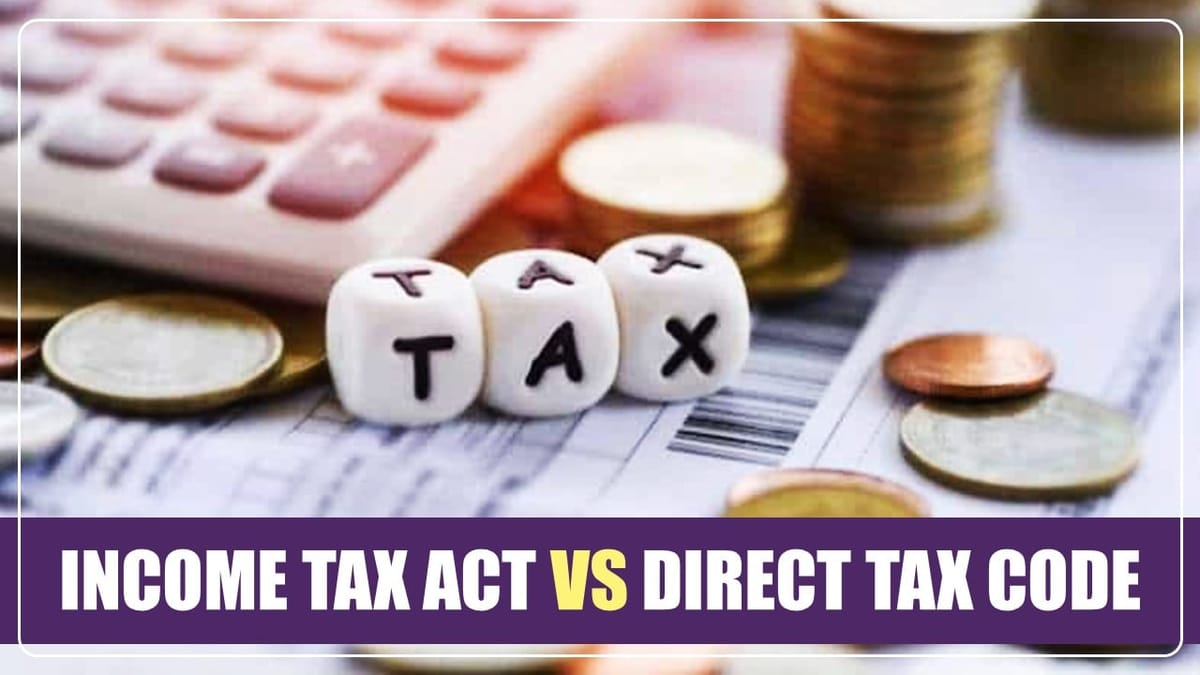The new Income Tax Act will be implemented within 6 months in the Country. This article explains the difference between the Income Tax Act and the Direct Tax Code.
Reetu | Sep 4, 2024 |

Difference between Income Tax Act and Direct Tax Code
We all know that Union Finance Minister Nirmala Sitharaman declared last month that the new Income Tax Act will be implemented within six months to replace the six decades-old Income Tax Act of 1961.
She explained earlier that implementing the new income tax act is the goal to make the Act brief, simple and easy to read and understand. So, Let’s understand the difference between the Income Tax Act and the Direct Tax Code in this article.
Here in this article few points are given that briefly explain the difference between the two.
In the Income Tax Act, we have the concept of the Previous Year and Assessment Year. However, in the Direct Tax Code, there is only the concept of financial year.
In the Income Tax Act, there are three categories of residential status – i). Resident, ii). Non-Resident and iii). Non Ordinarily Resident.
Meanwhile, in the Direct Tax Code, only residents and non-residents are considered to have residential status.
If we talk about which act is more simple, then the Direct Tax Code is considered to be simpler than the Income Tax Act as it doesn’t have provisions and any explanation. The Income Tax Act is more complex, as it contains various provisions and explanations in the section.
Income Tax Act provided that the Tax Audit can only be conducted by the Chartered Accountants (CAs) and no one else. The Direct Tax Code has the provision of conducting the Tax Audit by Chartered Accountants (CAs), Company Secretary (CS’s) and Cost Accountants.
Distributed Income like from LIC and Mutual Funds are taxable in nature but in the Income Tax Act, they are exempted from taxation. Means, Tax on Distributed Income is exempted.
Tax on Distributed Income is taxable @5% in the Direct Tax Code.
In the Income Tax Act, a Tax Rate of 30% + Surcharge @15% is applicable for Income above Rs.10 Crore.
In the Direct Tax Code, Income above Rs.10 Crore is taxable at the tax rate of 35%.
Dividends in the Income Tax Act are subject to Dividend Distribution Tax @15%. Dividends are taxed at @15% without Dividend Distribution Tax (DDT) in the Direct Tax Code.
Income Tax is levied on Income from Ordinary Sources. In the Direct Tax Code, we have the concept of Special and Ordinary Sources of Income. The heads of Income would be Employment Income, House property income, Business Income, Capital Gains and Income From Residuary Sources.
1) Tax-payer or/and who is liable for proceeding under the Act.
2) To whom the amount is refundable
3) Someone who voluntarily files tax return irrespective of tax liability
4.) Tax-payer or/and who is liable for proceeding under the Act
Above mentioned points show why the Income Tax Act and Direct Tax Code are totally different from each other with many pros and cons. Now, when the new income tax act is implemented in the country down the line after 6 months, what it will change and leave impact, is the triggering point to watch.
Based on PPT presentation of the DTC 2013 available on the ICSI website.
In case of any Doubt regarding Membership you can mail us at [email protected]
Join Studycafe's WhatsApp Group or Telegram Channel for Latest Updates on Government Job, Sarkari Naukri, Private Jobs, Income Tax, GST, Companies Act, Judgements and CA, CS, ICWA, and MUCH MORE!"